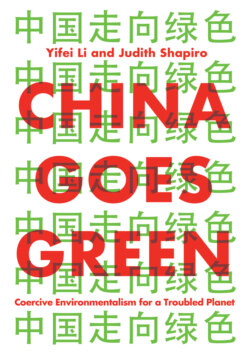China Goes Green

Реклама. ООО «ЛитРес», ИНН: 7719571260.
Оглавление
Judith Shapiro. China Goes Green
Contents
Guide
Pages
China Goes Green. Coercive Environmentalism for a Troubled Planet
Copyright page
Map
Acknowledgments
Introduction: The Rise of Authoritarian Environmentalism
Ecological Civilization as Political Philosophy
A Global Call to Action
What is State-led Environmentalism?
Authoritarianism in Green Clothing
Towards Mutually Agreed-upon Coercion
1 Asserting “Green” Control: The State and its Subjects
Campaigns and Crackdowns
Environmental Campaigns
Justifications and Risks
Target-setting
Targets Gone Awry
Behavior Modification
Environmentalism at a Price
Notes
2 “Green” China Pacifies its Borders
One-size-fits-all Policymaking
Afforestation by Monoculture
The Loess Plateau as an Unscalable Success
The Industrialized Forest of Uxin Banner
Green Grabbing: Hydropower as Ecological Civilization and Modernization
Green Grabbing as a Tool of Government Control
Citizen Resistance: The Nu River and Tiger Leaping Gorge
Ecological Migration: Sedentarizing Nomads and Building Parks
Protected Areas and National Parks
Pacifying Borderlands in the Name of the Environment
3 The State on the “Green” Belt and Road
The Belt and Road Initiative and the Environment
Win-win Green Development
The Quest for Soft Power
Green Technocracy
A Morass of Contradictions
4 Global China Goes “Green”
Mastering the Trade Game
Banning Global Waste Imports
Withholding Rare Earths
Curbing the Endangered Species Trade
Engineering China’s Atmosphere
Blue Skies or Bust
Constructing “Sky River”: Weather Modification on the Tibetan Plateau
Outer Space Environmentalism: The Digital Belt and Road
Geoengineering the Earth’s Climate
Mining the Moon
The Sleeping Lion Awakes
5 Environmental Authoritarianism on a Troubled Planet
Environmental Fix
Authoritarian Resilience
Techno-political Underpinnings
Transactional Logic
Indispensable Civil Society
Consultation under State Leadership
References
Index
POLITY END USER LICENSE AGREEMENT
Отрывок из книги
Yifei Li and Judith Shapiro
At around the same time, environmental governance was changing dramatically within China. Once seen as having weak environmental institutions with poor enforcement capabilities, China renamed and elevated the environment ministry to become the Ministry of Ecology and Environment, expanding and centralizing its portfolio of responsibilities to cover a broad range of pollutants including carbon emissions and water contaminants. Once seen as unable to control local officials who exploited lax enforcement to profit from pollution, China’s leaders changed criteria for performance evaluation to emphasize environmental protection and implemented severe punishments for local officials’ failures to fulfill environmental goals. Once seen as unable to enforce its assortment of environmental laws, China strengthened them, got rid of loopholes, created a system of dedicated environmental courts, and opened up the judicial process to environmental advocacy groups. Once seen as bent on destroying its own biodiversity, China reorganized the administration of protected areas and embarked on an ambitious program to conserve vast swaths of its West, under the authority of a new Ministry of Natural Resources. Once seen as holding open its door to some of the world’s most polluting industries and waste products, China banned them. The list could go on.
.....
Third, the rise of China’s state-led environmentalism reflects a broad trend toward power centralization under the leadership of President Xi Jinping. For example, measures to tackle “airpocalypses” in urban areas have followed a top-down model that excludes even lower-level officials from the political process, making environmental programs part of a much larger authoritarian agenda of state control and power centralization (Ahlers and Shen 2018; Kosta and Zhang 2018). Although centralization is often assumed to produce better environmental results (Gilley 2012), it is not a panacea when the central government lacks adequate information about complex local realities (Kostka and Nahm 2017). Moreover, in an increasingly authoritarian era, the state has embarked on aggressive initiatives to use emerging technologies and big data analytics to buttress the centralization of environmental power (Kostka and Zhang 2018). Existing research on China points to the emergence of a highly centralized “hard” authoritarian model of government (Shambaugh 2016), under which environmental policies become a vehicle for the consolidation and centralization of state power (Yeh 2013). The state profits from the environmental crisis by projecting itself as the sole legitimate steward of the environment.
Such dynamics are not limited to authoritarian regimes, although they find their starkest expression there. As Naomi Klein and others have argued, natural disasters can sometimes provide opportunities for capitalist societies to impose neo-liberal policies that might otherwise have been resisted (Klein 2010). This problem is related to what some scholars identify as the “environmental fix” for the capitalist crises of our time. David Harvey’s classic analysis of late capitalism points to its tendency to “fix” or deal with overaccumulation and underconsumption through global expansion into new spaces, temporarily displacing the crisis that results from such contradictions by finding new resources and markets (Harvey 1985; Bakker 2004; Castree 2008). State-led environmentalism can, and often does, serve non-environmental ends to strengthen the authority and reach of the state.
.....